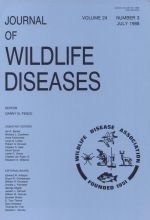Four isolates of alcelaphine herpesvirus-1 of malignant catarrhal fever (MCF) were tested for their inducibility of and sensitivity to various interferons. Viral isolates from an Indian gaur (Bos gaurus), a greater kudu (Tragelaphus strepsiceros) and two wildebeest (Connochaetes gnou) calves did not induce measurable interferon (IFN) in bovine fetal kidney cells. However, these low passages of each virus were all highly cell-associated and viral replication was inhibited at these passages by IFN at 14 IFN units/0.05 ml recovered from NDV-infected MDBK cells and at 7.6 IFN units/0.05 ml of IFN from NDV-infected bovine macrophages. The herpesvirus from the Indian gaur and greater kudu and high passages (>50) of the cell-free WC-11 strain of alcelaphine herpesvirus-1 also were inhibited in their replication by recombinant IFN of bovine and human origins as determined by a fluorescent focus unit (FFU) reduction assay. The concentrations of IFN required to produce a 50% reduction in herpesvirus-produced FFU ranged between 6.4 and 480 IFN units. These findings promote the use of IFN as part of the regimens of treatment of captive endangered ruminant species with clinical MCF.
BioOne.org will be down briefly for maintenance on 17 December 2024 between 18:00-22:00 Pacific Time US. We apologize for any inconvenience.
How to translate text using browser tools
1 July 1988
EFFECT OF INTERFERONS ON THE REPLICATION OF ALCELAPHINE HERPESVIRUS-1 OF MALIGNANT CATARRHAL FEVER
Siao-Kun Wan,
Anthony E. Castro,
Robert W. Fulton

Journal of Wildlife Diseases
Vol. 24 • No. 3
July 1988
Vol. 24 • No. 3
July 1988
alcelaphine herpesvirus
Bos gaurus
Connochaetes gnou
experimental study
greater kudu
Indian gaur
interferons




